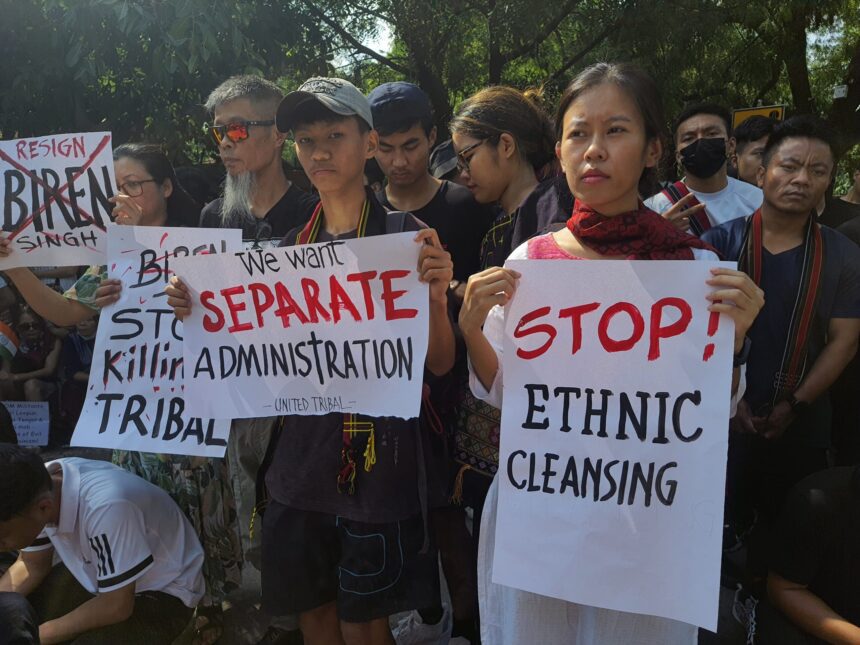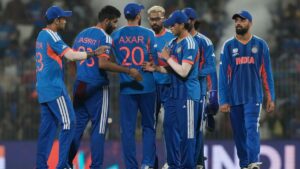The Kuki Organization for Human Right Trust has informed the Supreme Court that the Manipur Police sent only short and edited audio excerpts to the National Forensic Science University (NFSU), Gandhinagar, instead of the full 48-minute and 46-second recording that allegedly contains a conversation implicating former Manipur Chief Minister N. Biren Singh in the 2023 ethnic violence,” Live Law reported.
The audio clips released last year, exposed the alleged complicity of Chief Minister Biren Singh in the ethnic violence that has killed more than 200 people, injured several, and displaced at least 70,000 from the Kuki and Meitei communities.
The 48-minute audio clip was reportedly provided by a person who claimed to have recorded it at an official premises associated with Singh.
In the tape, a voice believed to be that of the Chief Minister describes a conversation between himself and Union Home Minister Amit Shah, discussing the use of “bombs” in the state. Singh allegedly claims credit for “starting the operations” and admits defying Shah’s orders while shielding militants who stole weapons from police armories.
Biren Singh allegedly recounts, “When Amit Shah came here, he asked, ‘Biren ji! Tum bomb marta hai? Bombs mat use karna (You are using bombs? Don’t use them).’ He instructed us to stop using bombs, summoning the DGP and all. After he left, I told them, ‘Hoi! Chupke se karna hai, open nahi karna hai (It should be used covertly, not openly). If you don’t trust me, check with the commandos on the frontline’.”
The organisation alleged that “the Respondent forwarded only four short, cut-out clips of durations 0:30, 1:28, 0:36, and 1:47 minutes, instead of the complete 48-minute and 46-second recording, thereby giving an incomplete and misleading representation of the evidence,” and argued that such selective transmission “raises serious concern regarding the bona fides of the Respondent’s conduct and its impact on the fairness of the ongoing investigation.”
The allegation is contained in a detailed affidavit responding to an NFSU report dated October 10, 2025, which found the audio files tampered with and unsuitable for scientific voice comparison.
The affidavit has been filed in support of the organisation’s writ petition seeking an independent, court-monitored probe into the alleged role of state machinery in the ethnic violence.
According to the affidavit sworn by the organisation’s chairman, Houlim Shokhapa Mate, the petitioner had submitted the full 48-minute and 46-second recording through a supplementary affidavit on January 22, 2025, and the Supreme Court had directed that this complete file be examined by NFSL.
However, the affidavit states that the Cyber Crime unit of the Manipur Police forwarded only the four short clips, 0:30, 1:28, 0:36 and 1:47 minutes, to the laboratory, and neither the petitioner nor counsel were informed that only fragments were being transmitted.
The affidavit says the petitioner genuinely believed the full recording had been sent.
The affidavit further states that because only cut-out segments were forwarded, the NFSU “could not verify the continuity or authenticity of the original recording,” and that even the Central Forensic Science Laboratory (CFSL) was unable to examine the audio for the same reason.
NFSL later informed the Supreme Court that the clips it received had been tampered with and were not scientifically fit for voice comparison, and therefore no opinion could be offered on whether the voice matched that of the former Chief Minister.
The affidavit adds that NFSU Gandhinagar confined its analysis to metadata and tampering detection, found “discontinuities and processing traces,” and declared the clips “tampered” or “AI-generated” without conducting auditory or spectrographic voice comparison.
It further asserts that even the control recordings (A1-A3) provided by Doordarshan Kendra, being original broadcast masters and admitted voice samples of Biren Singh, were wrongly treated by NFSU as “processed/altered” and declared unfit for comparison.
Setting out its reply to NFSL’s conclusions, the affidavit contrasts the NFSU findings with an earlier examination by Truth Labs, which analysed two pen drives submitted by the petitioner on November 14, 2024, Pen Drive A containing the full impugned recording and Pen Drive B containing speeches of the Chief Minister.
Truth Labs conducted auditory, acoustic, spectrographic and statistical tests and concluded on January 18, 2025, that the voices matched with 93 percent probability.
The affidavit argues that “the report of Truth Labs thus reflects far greater scientific diligence and evidentiary value, whereas the Gandhinagar report suffers from procedural and methodological infirmities arising from the incomplete material forwarded.”
According to the petitioner, transcripts of the 48-minute recording, first published in August 2024, allegedly showed involvement of the state machinery in the 2023 clashes between Meitei and Kuki communities.
The affidavit also notes that the Justice Lamba Commission of Inquiry received the full recording but later forwarded a shorter version to Truth Labs after removing portions to protect the identity and safety of the concerned person.
The organisation asserts that it has complied with all Supreme Court directions since November 8, 2024, while the State has repeatedly forwarded incomplete material.
They reiterated the request for a court-monitored Special Investigation Team to examine the recording and related allegations, contending that the material on record shows prima facie involvement of the highest functionary of the State and that the question of authenticity should now be examined by investigators rather than the Court.
It argues that “such an exercise is squarely within the domain of the investigating agency,” and that a duly constituted SIT would be best positioned to determine authenticity and investigate any larger criminal conspiracy behind the leak.
The affidavit states that the inconclusiveness of the forensic report “cannot, by itself, be treated as a ground to stifle investigation at the threshold,” and that even if no material is ultimately found, “a closure report may be filed in accordance with law.”
They demanded that a criminal case must be set in motion based on the audio recording and the Truth Labs report “so that the truth may emerge through a fair, independent, and comprehensive investigation.”
The post Kuki rights group tells Supreme Court Manipur Police sent only edited audio clips in Biren Singh recording probe appeared first on Maktoob media.










